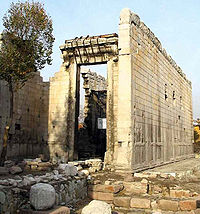- Res Gestae Divi Augusti
-
Res Gestae Divi Augusti, (Latin: "The Deeds of the Divine Augustus") is the funerary inscription of the first Roman emperor, Augustus, giving a first-person record of his life and accomplishments. The Res Gestae is especially significant because it gives an insight into the image Augustus portrayed to the Roman people. Various inscriptions of the Res Gestae have been found scattered across the former Roman Empire. The inscription itself is a monument to the establishment of the Julio-Claudian dynasty that was to follow Augustus.
Contents
Structure of the text
The text consists of a short introduction, 35 body paragraphs, and a posthumous addendum. These paragraphs are conventionally grouped in four sections,[1] political career, public benefactions, military accomplishments and a political statement.
The first part (paragraphs 2 – 14) is concerned with Augustus' political career, it records the offices and political honours that he held. Augustus also lists numerous offices he refused to take and privileges he refused to be awarded. The second part (paragraphs 15 – 24) lists Augustus' donations of money, land and grain to the citizens of Italy and his soldiers, as well as the public works and gladiatorial spectacles that he commissioned. The text is careful to point out that all this was paid for out of Augustus' own funds. The third part (paragraphs 25 – 33) describes his military deeds and how he established alliances with other nations during his reign. Finally the fourth part (paragraphs 34 – 35) consists of a statement of the Romans' approval for the reign and deeds of Augustus. The appendix is written in the third person, and likely not by Augustus himself. It summarizes the entire text, and lists various buildings he renovated or constructed; it states 600 million denarii(= 600,000 of gold) from his own funds were spent during his reign towards public projects. It is not possible to reliably convert ancient currencies into modern equivalents, but it is clearly more than anyone else in the Empire could afford. The annual expenses of the Roman State during the reign of Augustus are unknown, but modern authors estimate 200-300,000 pounds of annually (250-300 million denarii).
History
According to the text it was written just before Augustus' death in AD 14, but it was probably written years earlier and likely went through many revisions.[citation needed] Augustus left the text with his will, which instructed the Senate to set up the inscriptions. The original, which has not survived, was engraved upon a pair of bronze pillars and placed in front of Augustus' mausoleum. Many copies of the text were made and carved in stone on monuments or temples throughout the Roman Empire, some of which have survived; most notably, almost a full copy, written in the original Latin and a Greek translation was preserved on a temple to Augustus in Ancyra (the Monumentum Ancyranum of Ankara, Turkey); others have been found at Apollonia and Antioch, both in Pisidia.
By its very nature the Res Gestae is less objective history and more propaganda for the principate that Augustus instituted. It tends to gloss over the events between the assassination of Augustus' adoptive father Julius Caesar and the victory at Actium when his foothold on power was finally undisputed. Caesar's murderers Brutus and Cassius are not referred to by name, they are simply "those who killed my father." The Battle of Philippi is mentioned only passim and not by name. Mark Antony and Sextus Pompeius, Augustus' opponents in the East, remain equally anonymous; the former is "he with whom I fought the war," while the latter is merely a "pirate." Likewise, the text fails to mention his imperium maius and his exceptional tribunicial powers. Often quoted is Augustus' official position on his government: "From that time (27 BC, the end of the civil war) I surpassed all others in influence, yet my official powers were no greater than those of my colleague in office." This is in keeping with a reign that promoted itself from the beginning as a "restoration" of the old republic, with a leader who was nothing more than "first among equals," but was virtually akin to absolute monarchy by divine right, backed by the swords of the legions.
The Res Gestae was a unique public relations move for the first emperor of the Roman Empire, whose political career was in many ways experimental. If their frequent use as "history" by later historians (both ancient and modern) who characterized Augustus' rule according to categories he himself constructed in the Res Gestae is any indication, it is a rather successful piece of propaganda. On the other hand, it would be absurd to overlook the usefulness to historians of what is essentially a first-person account of his rule.
See also
- Lucius Cornelius Scipio Barbatus, whose sarcophagus carries a short inscription in Saturnian metre commemorating his deeds
- Behistun Inscription, commissioned by Darius I of Persia
References
- ^ Although there are other possible groupings; see discussion in Scheid, "Introduction", XXXVI-XLIII.
Bibliography
- Barini, Concetta (1937), (Ancient Greek) / (Latin) Res Gestae Divi Augusti ex Monumentis Ancyrano, Antiocheno, Apolloniensi, Rome.
- Cooley, Alison (2009), (English) Res Gestae divi Augusti: Text, Translation and Commentary, Cambridge: Cambridge University Press, 2009. ISBN 978-0521841528
- Gagé, Jean (1935), Res gestae divi Augusti ex monumentis Ancyrano et Antiocheno latinis, Paris.
- Mommsen, Theodor (1865). Res gestae Divi Augusti ex monumentis Ancyrano et Apolloniensi. Berolini: Weidmannos, 1865.
- Scheid. John (2007). (French) Res Gestae Divi Augusti: hauts faits du divin Auguste. Paris: Belles Lettres, 2007. ISBN 978-2251014463
- Volkman, Hans (1942), Res gestae Divi Augusti Das Monumentum Ancyranum, Leipzig.
External links
Categories:- Articles with Ancient Greek language external links
- Augustus
- Latin histories
- Roman religion inscriptions
Wikimedia Foundation. 2010.


